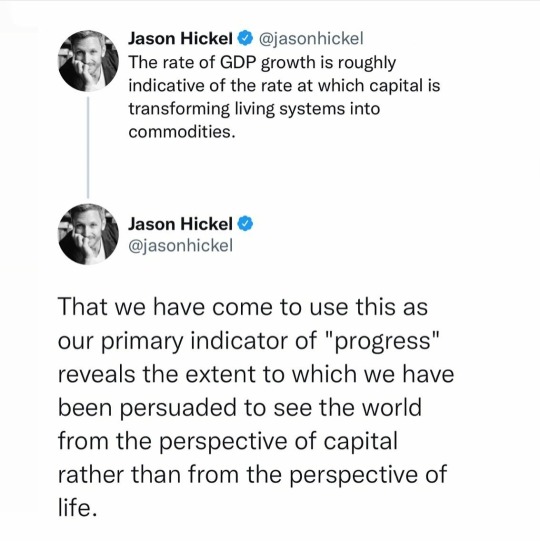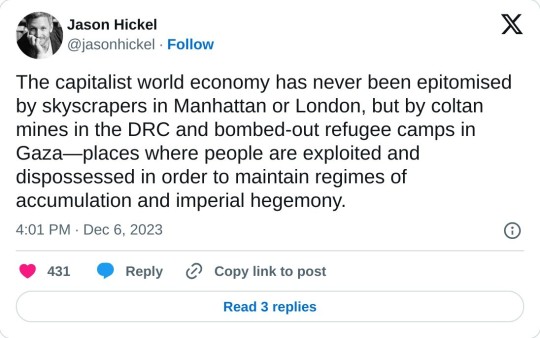#Jason Hickel
Text
Extreme poverty should not exist, period. The fact that up to 17 percent of the world population lives in extreme poverty today (according to Robert Allen’s data on cost-of-basic-needs poverty) should be understood as an indictment of our economic system. It is a sign that severe social dislocation remains institutionalized in the capitalist world economy. Yes, the prevalence of extreme poverty is lower today than it was at the height of the colonial period, but this is not sufficient reason for celebration. The colonial high-water mark was an effect of capitalist policy and should never have existed.
Furthermore, extreme poverty can and should be ended immediately. It does not require further increases in aggregate production, it does not require a massive mobilization of charity; rather, it requires no more than restoring people’s access to the basic resources they need for survival. The existing world economy, despite its extraordinary output, appears incapable of achieving this basic objective: projections indicate that with existing trends it will take at least forty years to end extreme poverty, even according to the World Bank’s inadequate metric (three decades later than promised by the sustainable development goals), and possibly as long as a century. This should be condemned as a failure. Instead, we are enjoined to accept as “normal” a form of suffering that need not exist and can be ended immediately. What is required? We must ensure peasants have access to productive land, workers have secure employment and living wages, and universal access to affordable housing and food. This is not complicated, it is basic.
Jason Hickel and Dylan Sullivan, Capitalism, Global Poverty, and the Case for Democratic Socialism
105 notes
·
View notes
Text
“This is the core principle of capitalism: that the world is not really alive, and it is certainly not our kin, but rather just stuff to be extracted and discarded - and that includes most of the human beings living here too. From its very first principles, capitalism has set itself at war against life itself.”
— Jason Hickel, Less is More: How Degrowth Will Save the World
828 notes
·
View notes
Text
The problem is not simply that capitalism produces too much, but that it produces the wrong stuff: SUVs, fast fashion and planned obsolescence instead of public transit, affordable housing and universal healthcare. It overuses resources and still fails to meet even basic needs.
In this respect it is a wildly inefficient system. This is the sort of irrationality you get when production is organized around the interests of corporate profit and elite accumulation, rather than around human well-being and ecology.
Jason Hickel
70 notes
·
View notes
Text
This text below was written by the professor and author Jason Hickel and can be found here.
“People often assume there is a natural connection between capitalism and democracy. Sometimes the two concepts are virtually fused together.
I always find this odd, because I value democracy. But there is nothing democratic about capitalism.
Under capitalism, decisions about what to produce, how to utilize the labour and resources of the nation, and what to do with the surplus that we generate—all of this is controlled overwhelmingly by the 1% who own the majority of corporate shares and pick the directors of firms.
This is pretty wild, when you think about it. Yes, we have national elections. But when it comes to the economic system, which affects all of our lives and determines our common destiny, it is totally undemocratic. In fact it is literally a plutocracy.
When you govern a system like this, it means that production is likely to be organized *not* around meeting human needs, or ecological regeneration, but around maximizing the profits and power of the 1%.
Not surprisingly, this leads to perverse results. We have an economy with extraordinary productive capacity, that massively overuses resources, but still fails to ensure that everyone has access to basic goods and services like healthcare, housing, transit and so on.
What is more, those who control this system then leverage their profits to manipulate national elections, through campaign finance and advertising, or through outright control over media outlets. Democracy cannot function under these conditions.
It doesn't have to be this way. We know, empirically, that when people have democratic control over production, they manage resources more sustainably, meet human needs more efficiently, and distribute surplus more fairly.
Decisions about what to produce and how to use our collective surplus should be democratically determined, rather than controlled by and for the interests of capitalists. The path out of capitalism is economic democracy.”
554 notes
·
View notes
Text
The wage data also reveals that, rather than delivering progress against poverty, the rise of capitalism was associated with a deterioration in human welfare across Europe.12 Following the peasant and worker rebellions in the 14th century, wages rose high enough to support a family of four above the ‘respectability’ line (i.e., $4.33, represented by a dotted line on Figure 5). But during the long 16th century wages plummeted, particularly in the European periphery, which was de-industrialized and reduced to a raw material supplier for English and Dutch manufacturers (Wallerstein, 1974, Moore, 2010a, Frank, 1978, Watson, 2017). In the core, wages only began to rise above their 15th-century level in the 1880s – around four centuries after the rise of capitalism and 50 years later than the standard narrative suggests. For most of the European periphery, poverty alleviation began later, “indeed, only in the post-World War II boom” (Allen, 2001, p. 435). This trend corresponds with the rise of organized labour and socialist parties across Europe (Pelz, 2016, pp. 83–102; Geary, 1981). As we shall see, progress in Europe has been much more extensive than elsewhere. Flush with surplus extracted from the colonies, European capitalists could respond to the demands of popular movements, and improve working class incomes, without significantly threatening the accumulation of capital (Cope, 2019, Lauesen, 2021).
— Dylan Sullivan and Jason Hickel, Capitalism and extreme poverty: A global analysis of real wages, human height, and mortality since the long 16th century
166 notes
·
View notes
Text
"[C]onsider this: to bring everyone in the world above the income poverty line of $7.40 per day, and to provide universal public healthcare for every person in the global South at a standard equivalent to that in Costa Rica, would require about $10 trillion. That’s a significant sum, on the face of it. But notice that it’s only half of the annual income of the richest 1%. In other words, if we were to shift $10 trillion of excess annual income from the richest 1% to the global poor, we could end poverty in a stroke, and boost life expectancy in the global South to eighty years – eliminating the global health gap. And the richest 1% would still be left with an average annual household income of more than a quarter million dollars: more than anyone could ever reasonably need, and nearly eight times higher than the median household income in Britain. And that’s just income; we haven’t even touched wealth. The richest 1% have accumulated wealth worth $158 trillion, which amounts to nearly half of the world’s total."
- from Less Is More by Jason Hickel
7 notes
·
View notes
Photo

The fact that the most important gains in human welfare have been won by labour unions and social movements, enabled by publicly funded research and secured by public healthcare and education systems, almost always in the face of determined and even violent resistance from the capitalist class, is never acknowledged [by the New Optimists]. (via Progress and its discontents | New Internationalist)
#New Optimists#capitalism#economics#Jason Hickel#poverty#global poverty#inequality#society#Bill Gates#Steven Pinker#data
30 notes
·
View notes
Text
Just as Northern growth is colonial in character, so too “green growth” visions tend to presuppose the perpetuation of colonial arrangements. Transitioning to 100 percent renewable energy should be done as rapidly as possible, but scaling solar panels, wind turbines and batteries requires enormous material extraction, and this will come overwhelmingly from the global South. Continued growth in the North means rising final energy demand, which will in turn require rising levels of extractivism.
Jason Hickel in Political Geography access at LSE Research Online. The anti-colonial politics of degrowth
3 notes
·
View notes
Text
Book Group meets Saturday, January 14, 5pm on Zoom
We'll discuss the second half of LESS IS MORE by Jason Hickel. Email [email protected] for the Zoom link

“Jason Hickel shows that recovering the commons and decolonizing nature, cultures, and humanity are necessary conditions for hope of a common future in our common home. By extracting less we leave more for other species, other people and future generations, thus creating well-being for all. In an ecologically interconnected world, less is more.” -- Vandana Shiva
#debt#strike debt#strike debt bay area#capitalism#anticapitalism#degrowth#jason hickel#climate crisis
6 notes
·
View notes
Text
“It is astonishing that the dominant belief in economics holds that no matter how rich a country has become, their GDP should keep rising, year after year, with no identifiable end point. It is the definition of absurdity. We do see this pattern playing out in nature, sometimes, but only with devastating consequences: cancer cells are programmed to replicate for the sake of replicating, but the result is deadly to living systems.”
— Jason Hickel, Less is More
4 notes
·
View notes
Text
When myths fall apart, revolutions happen.
Jason Hickel, The Divide
2 notes
·
View notes
Text
youtube
CW for depressing climate stuff at the start, I guess. The book makes up for it, though.
Jason Hickel's "Less Is More: How Degrowth Will Save The World" is excellent. Read it.
Link to the eco-economics book: https://www.researchgate.net/publicat...
---------- Music in order of appearance ---------
???????????*
Without - Unfound
???????????*
Boss music from Legend of Zelda: Ocarina of time
???????????*
My own jingles
*Question marks because the person behind the playlist I got the music from ( • Vaporwave Chill Non-CopyRight Music! ... ) didn't have the courtesy to credit the artists
#degrowth
#Eyeball Zone#Glocal Weirdo#degrowth#doomscrolling#Covid#eco anxiety#Jason Hickel#Less is More#GDP#Resources#Decoupling#climate crisis#recession#planned obsolescence#right to repair#advertising#fallacies#GPI#equality#rent#mass movement#You're not the only one#ecological crisis
1 note
·
View note


